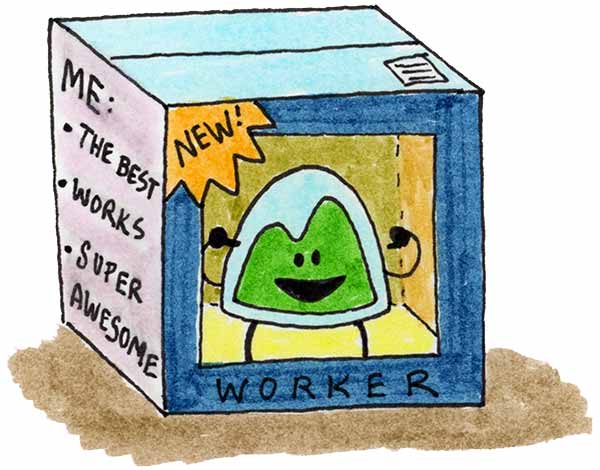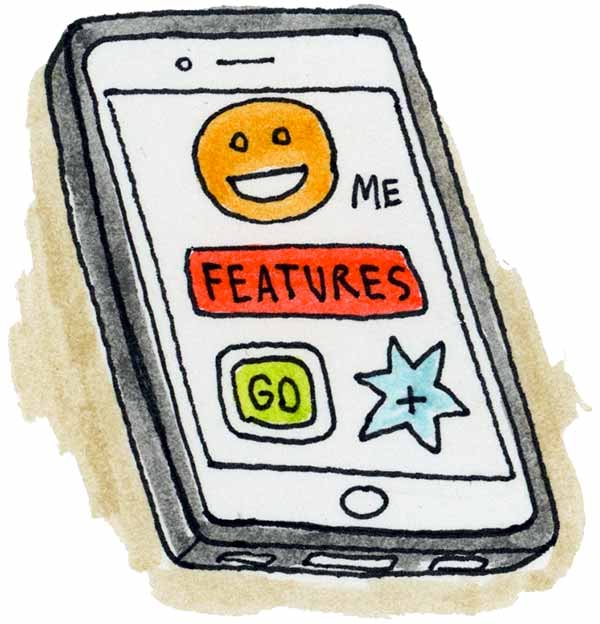Once or twice a year I find myself on the receiving end of job applications. That’s the case today as we consider candidates for our open position on Basecamp’s mobile team. Having reviewed over 100 applications so far I’ve seen a wide variety of approaches. It occurred to me that the best applications are a lot like great products.
 The best products are easy and enjoyable to use, they make us feel successful. Similarly, the best job applications make it easy for someone to hire you. In a moment I can tell you read the job posting carefully, you included all the relevant information, you’ve done your homework (you know something about the company and its products), you actually want the job (do not play hard-to-get!), and you’re nice.
The best products are easy and enjoyable to use, they make us feel successful. Similarly, the best job applications make it easy for someone to hire you. In a moment I can tell you read the job posting carefully, you included all the relevant information, you’ve done your homework (you know something about the company and its products), you actually want the job (do not play hard-to-get!), and you’re nice.
There is a real person on the other end of your job application responsible for making a decision. They’re worried about making a bad choice; one that could embarrass them in front of their boss and coworkers; one that could cost them money, their job, or even their company! They want to feel good about hiring you and they want it to be easy.
Think of your job application as the user interface for you, the product, as you consider these suggestions:
Good software does work for you
 Many job application emails are simply an invitation to visit the candidate’s website to “learn all about me”. I have no doubt that those sites contain everything I need to know including links to Github repos and fulfill all the requirements laid out in the job post but don’t leave it to the hiring manager to sift out the good stuff. Why trust that they’ll pull out the best bits anyway? Surface your highlight reel right in the email. If all you had was a thirty second elevator conversation in which to tell someone why they should consider you for the job, what would you say? Write that.
Many job application emails are simply an invitation to visit the candidate’s website to “learn all about me”. I have no doubt that those sites contain everything I need to know including links to Github repos and fulfill all the requirements laid out in the job post but don’t leave it to the hiring manager to sift out the good stuff. Why trust that they’ll pull out the best bits anyway? Surface your highlight reel right in the email. If all you had was a thirty second elevator conversation in which to tell someone why they should consider you for the job, what would you say? Write that.
Avoid feature bloat
You may have 20 years of experience, know 30 programming languages, have shipped 40 apps, and pushed 1000 commits to OSS projects but as the user of your job application I only need a few of these “features”. No one gets hired for being comprehensive. If you have so much experience and can do all of these different things—great!—you can apply to many different jobs, but for each one, trim down to the skills and experience that matter most. Be a curator.
Of course, if you’re applying for a job at a Fortune 500 company where you know your résumé is going to be sucked into a database only to be retrieved by some keyword matching algorithm, then by all means detail every job, every language, every piece of software—pack it full of keywords. Just don’t use that same application when applying to the founder with a team of five.
Get the message right
 You wouldn’t wear a suit to interview with a Silicon Valley start-up (unless it was totally ironic, right?) so why would you send them a dry, boring resume and cover letter from a template you Googled? If you’re applying for a job that requires you to be creative and inventive, why not be creative and inventive? Take an approach they’ve never seen before. Imagine everyone who applies for the same job is completely qualified—what makes you the right person for the job? Chances are it’s something that isn’t even on your résumé. It’s your personality or your effort. Sometimes it’s as simple as being clear that you’re not not seeking a job but this job.
You wouldn’t wear a suit to interview with a Silicon Valley start-up (unless it was totally ironic, right?) so why would you send them a dry, boring resume and cover letter from a template you Googled? If you’re applying for a job that requires you to be creative and inventive, why not be creative and inventive? Take an approach they’ve never seen before. Imagine everyone who applies for the same job is completely qualified—what makes you the right person for the job? Chances are it’s something that isn’t even on your résumé. It’s your personality or your effort. Sometimes it’s as simple as being clear that you’re not not seeking a job but this job.
Nobody likes spam
If your job application consists of a one-line email with a résumé attached you’d better send out a ton of them because you can probably count on the same return rate as the Cheap Meds guys. If it looks like you spent 15 seconds applying for the job why would you expect the person hiring to spend any more time reading your application? What if you were delivering your résumé in person? What would you say? Again, write that.
Wait! You’re just being lazy!
You might be tempted to refute these observations by simply calling me lazy (it might even be fair). The point here isn’t to demand, “these are the things you must do to get hired” but to make clear that some people are already doing them. They’re the ones who make hiring them a no-brainer.
That’s who you’re up against.

Sal Conigliaro
on 11 Aug 15Great points, Jason!
I especially like the part about doing the bare minimum by pointing the hiring person to your website.
Same thing with typos. If your attention to detail is that bad on a cover letter, what about the rest of your work?
I get it; writing about yourself is hard for some people. But you’ve got to do your best to show your personality.
Ross Belmont
on 11 Aug 15Are you using any software to track this process?
JZ
on 11 Aug 15@Ross – All the emails come into a gmail account for triage. We star the ones we like most and then put the top candidates in Basecamp lists for internal tracking and discussion.
Dan Yost
on 11 Aug 15Enjoyable. Good post here with helpful thoughts. My favorite is the last: you’re competing. That’s the bottom line. It’s a free [job] market. Do whatever you want, but remember, just like the athlete: somewhere, right now, somebody’s working harder than you, getting faster than you, lifting more than you, focusing better than you. Or is that possible? Make sure it’s not.
JZ
on 11 Aug 15I can’t +1 your point hard enough, Dan. Maybe it’s the “everyone’s #1” treatment that all us Gen-Xers (and beyond) got growing up but I get the feeling so many applicants never realize they’re competing. They just tick the boxes and hope for the best or something.
I find it striking how big a leg up effort and desire are. You don’t need much of either to step way out ahead.
This discussion is closed.